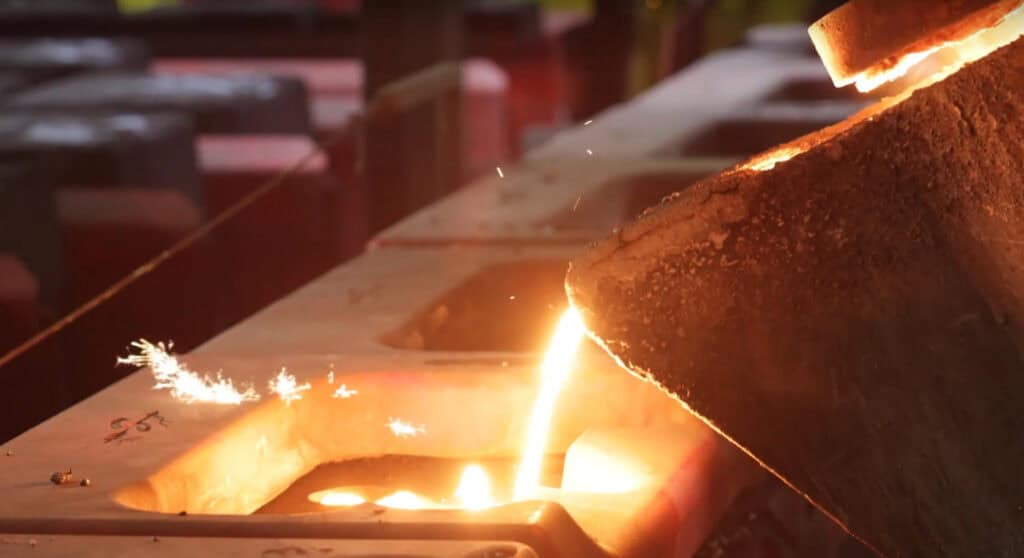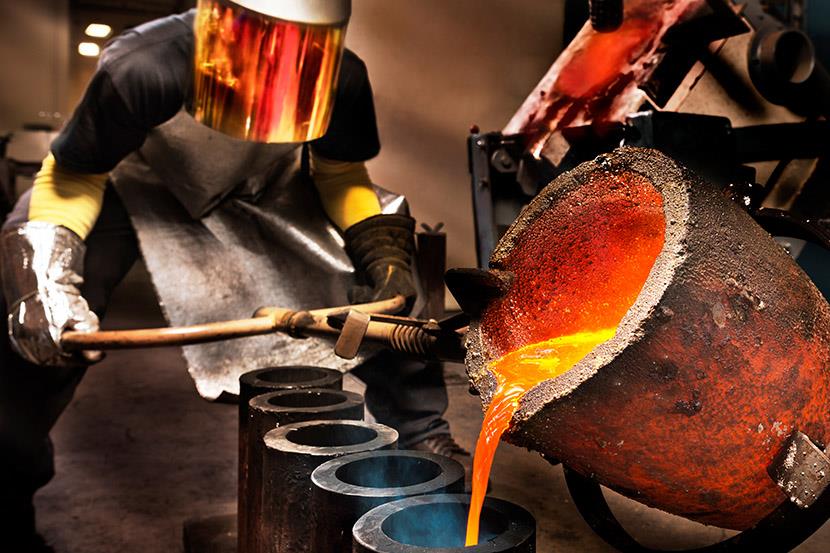Unveiling the modern advances reshaping the Aluminum Foundry industry
Wiki Article
Exactly How a Metal Foundry Adds to Sustainable Metal Production Practices
Metal foundries play a crucial role in promoting sustainability within the metal manufacturing industry. By integrating recycled products, they minimize dependence on virgin sources and lessen environmental impacts. Energy-efficient melting processes even more reduce energy usage and discharges. Nevertheless, the journey toward lasting practices includes more than simply recycling and energy administration. It encompasses a broader commitment to honest sourcing and innovative innovations. The ramifications of these methods are significant and warrant closer evaluation.The Role of Recycling in Metal Foundries
While metal production has traditionally relied upon virgin materials, the boosting focus on sustainability has actually resulted in a substantial shift in techniques, especially in metal foundries. Recycling has emerged as a crucial part of this makeover, permitting foundries to repurpose scrap metal and minimize reliance on mined sources. By integrating recycled materials right into their procedures, foundries not only decrease ecological effect however likewise reduced manufacturing expenses.Making use of recycled metals, such as copper, light weight aluminum, and steel, minimizes energy intake and minimizes greenhouse gas emissions linked with typical mining and refining techniques. Foundries can attain high-quality outcomes by utilizing sophisticated sorting and processing innovations to assure the pureness of recycled materials. This focus on recycling fosters a circular economic situation, where waste is reduced, and resources are used efficiently. Metal foundries play a crucial role in advertising sustainable techniques within the metal manufacturing market.
Energy-Efficient Melting Methods
Energy-efficient melting strategies are important for improving sustainability in metal production. These methods substantially lower energy intake throughout the melting procedure, which is just one of one of the most energy-intensive phases in metal production. Technologies such as induction melting, resistance heating, and microwave melting offer improved performance contrasted to conventional techniques. Induction melting, for example, makes use of electro-magnetic areas to create warm directly within the metal, reducing energy loss and offering specific temperature control.Furthermore, executing warm recovery systems can even more boost performance by recycling and capturing waste heat generated during melting. Using innovative insulation products and optimizing heater layouts additionally add to power financial savings. By adopting these innovative melting techniques, metal foundries can reduce their carbon footprint, decrease operational costs, and add to an extra sustainable manufacturing landscape. The combination of energy-efficient practices not just straightens with ecological objectives however also meets the expanding need for accountable manufacturing methods in the metal sector.
Lasting Sourcing of Raw Products
Sustainable sourcing of raw products is essential for minimizing the environmental impact of metal production. This includes the increased application of recycled steels, the fostering of moral mining practices, and initiatives focused on regional sourcing. By focusing on these methods, the market can advertise accountable resource monitoring and support regional economic climates.
Recycled Metal Utilization
How can sectors effectively minimize their environmental influence while meeting the expanding demand for metal? One substantial technique is the application of recycled metal. By incorporating scrap metal right into their manufacturing processes, foundries can reduce the removal of virgin materials, thereby minimizing and saving all-natural sources power consumption. Recycled steels require less energy to process compared to their raw equivalents, resulting in lower greenhouse gas exhausts. Additionally, using recycled metal aids draw away waste from landfills, advertising a round economic situation. Industries that prioritize recycled metal not only add to sustainability but additionally benefit from cost savings associated with minimized product purchase. As a result, recycled metal application stands as a necessary approach for eco responsible metal production.Honest Mining Practices
While the demand for steels remains to climb, markets are progressively identifying the importance of honest mining practices in guaranteeing liable sourcing of basic materials. Ethical mining encompasses a dedication to environmental stewardship, social duty, and adherence to fair labor methods. Firms are currently focusing on partnerships with mines that show openness in their operations, reducing environmental influence and respecting local neighborhoods. This method not only fosters a lasting supply chain yet likewise enhances the reputation of organizations involved. By executing rigorous criteria and accreditations, industries can combat prohibited mining activities and advertise the welfare of employees. Eventually, honest mining techniques contribute considerably to a much more sustainable metal manufacturing ecological community, aligning financial growth with ecological and social stability.Local Sourcing Efforts

Innovations in Metal Casting Processes
Developments in metal casting processes are transforming the sector by integrating advanced recycling strategies that lessen waste. Energy-efficient melting methods are additionally being created to reduce energy usage during production. In addition, making use of cutting-edge use this link mold products adds to improved performance and sustainability in casting operations.Advanced Recycling Techniques
Advanced recycling strategies are changing metal casting processes, significantly enhancing sustainability in the industry. These technologies concentrate on reclaiming and recycling scrap metal, substantially minimizing waste and the requirement for virgin materials. Methods such as hydrometallurgy and pyrometallurgy enable foundries to remove valuable steels from used parts, making sure efficient source utilization. In addition, advanced sorting and filtration innovations improve the top quality of recycled metals, making them ideal for high-performance applications. This not only decreases the environmental impact of metal production yet additionally promotes a round economy by advertising the reuse of materials. As these reusing approaches remain to advance, they guarantee to additionally streamline procedures within foundries and contribute to a much more lasting metal production landscape.Energy-Efficient Melting Techniques
While traditional melting techniques have actually long been the foundation of metal casting, recent improvements have actually introduced energy-efficient techniques that significantly lower energy consumption and discharges. Technologies such as induction melting and electric arc heaters have actually obtained prominence, permitting specific control over temperature and decreasing the demand for fossil gas. These methods not only boost power efficiency however additionally advertise faster melting times, which translates to reduce functional prices. In addition, innovations in heat recuperation systems make it possible for foundries to capture and reuse excess heat generated throughout the melting process. This holistic method to power monitoring not just sustains lasting techniques yet additionally placements metal foundries as leaders in the change in the direction of Aluminum Casting greener manufacturing procedures, even more aligning with international sustainability goals.Innovative Mold Materials
As the need for even more effective and sustainable metal casting procedures expands, the exploration of innovative mold and mildew materials has ended up being a prime focus in the industry. Standard mold and mildew materials typically contribute to ecological difficulties, triggering the search for alternatives that reduce waste and power intake. Current developments include the development of biodegradable binders and recyclable compounds, which not only enhance mold and mildew performance yet likewise reduce ecological influence. Furthermore, the usage of 3D printing innovation in mold production permits elaborate layouts that minimize material use and make it possible for rapid prototyping. These ingenious materials not only improve casting accuracy but also align with sustainability goals, showcasing the sector's commitment to minimizing its carbon footprint while preserving premium manufacturing standards.Decreasing Waste Via Advanced Technology
Cutting-edge technologies are transforming the metal production market by greatly minimizing waste and boosting efficiency. Advanced data analytics and machine knowing algorithms allow foundries to maximize manufacturing processes, determining ineffectiveness and decreasing scrap material. Smart sensing units keep go to these guys an eye on tools performance in real-time, enabling for predictive maintenance that decreases downtime and waste generation. Furthermore, additive manufacturing techniques, such as 3D printing, enable the creation of complex parts with minimal material use, considerably decreasing waste compared to traditional methods.
Closed-loop systems are becoming extra widespread, where scrap metal and by-products are recycled back right into the production cycle, ensuring that products are used to their maximum potential. This assimilation of technology not only advertises resource preservation however additionally improves the overall sustainability of metal production techniques. By accepting these advancements, foundries can contribute to a much more sustainable future while preserving competitiveness out there
The Impact of Foundries on Carbon Impact Reduction
Foundries play an essential duty in minimizing the carbon impact of the metal manufacturing sector by carrying out various lasting techniques. By utilizing energy-efficient modern technologies, such as electrical arc furnaces, these centers significantly lower greenhouse gas emissions contrasted to standard approaches. In addition, foundries increasingly take on renewable resource resources, which also reduces their reliance on nonrenewable fuel sources.Reusing scrap metal is another vital method that foundries employ, saving sources and reducing the requirement for virgin products. This not just reduces waste yet likewise lowers the energy-intensive removal procedures connected with mining. The fostering of closed-loop water systems helps to reduce water usage and minimize wastewater discharge, adding to a much more lasting operation.
With these efforts, foundries show their dedication to ecological stewardship, leading to a significant decrease in the overall carbon footprint of the metal production industry. Their continuous efforts are essential in the change towards a much more sustainable industrial landscape.
Often Asked Inquiries
What Sorts of Metals Are Many Frequently Recycled in Foundries?
Aluminum, steel, copper, and brass are among the most typically recycled metals in foundries. These steels are preferred as a result of their high recycling prices, economic value, and prevalent schedule, adding substantially to commercial sustainability initiatives.Just How Do Foundries Make Sure the Top Quality of Recycled Products?
Foundries establish the high quality of recycled materials through strenuous screening, sorting, and filtration procedures. They implement advanced modern technologies to assess structure and remove contaminations, ensuring that the recycled metals fulfill market standards for performance and security.
What Accreditations Exist for Lasting Foundry Practices?
Different qualifications exist for lasting foundry practices, consisting of ISO 14001 for environmental management, ISO 50001 for energy administration, and LEED certification for sustainable structure techniques (Metal Foundry). These qualifications aid assure adherence to ecological and sustainability criteria in proceduresHow Do Foundries Determine Their Carbon Footprint Reduction?
Foundries gauge carbon footprint decrease through tools like lifecycle assessments, power audits, and exhausts tracking systems. They compare standard emissions to existing outcomes, evaluating enhancements in energy effectiveness, material use, and renewable resource adoption in time.What Are the Financial Advantages of Sustainable Metal Production?
Lasting metal manufacturing provides economic advantages such as lowered functional costs, raised effectiveness, improved market competition, and potential government incentives. In addition, it promotes advancement and brings in eco mindful customers, inevitably driving lasting profitability for companies.Metal foundries play a crucial role in promoting sustainability within the metal production market. While metal production has typically depended on virgin products, the boosting focus on sustainability has actually led to a substantial shift in techniques, specifically in metal foundries. By including scrap metal right into their manufacturing procedures, foundries can lower the removal of virgin products, consequently preserving all-natural resources and minimizing energy usage. Foundries play a crucial duty in reducing the carbon footprint of the metal production industry by implementing various sustainable practices. Recycling scrap metal is another crucial method that foundries employ, conserving resources and reducing the need for virgin products.
Report this wiki page